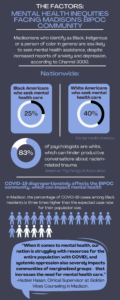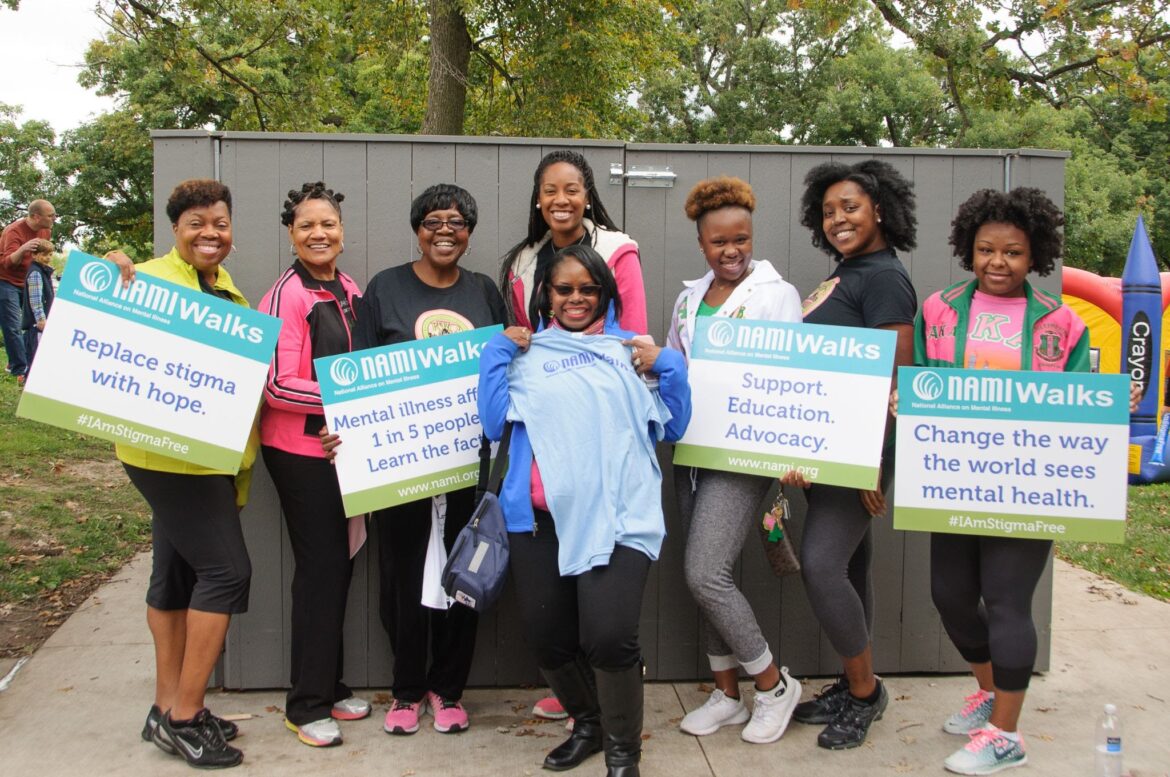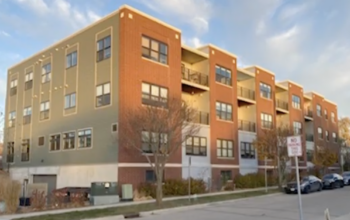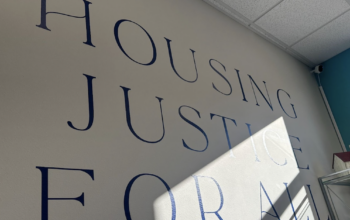Pandemic exacerbates inequities for BIPOC residents
When Nikyra McCann was 20 years old, she experienced a mental health-related outburst that changed the course of her life. She was arrested outside of her Madison home and transported to a mental health institution, where upon arrival the staff held down her arms and legs and injected her with medicine.
After she was brought to Mendota Mental Health Institute, McCann was diagnosed with bipolar disorder.
“When I was first diagnosed, I was just yelling outside of my home,” McCann said. “And they were just like, ‘Oh, this girl, she’s Black, she must be crazy.’ ”

McCann said she feels that her struggles with mental health have been impacted by her identity as a Black woman.
“They never really had a sit-down with my family to try to figure out the ins and outs of what was going on with me,” McCann said. “It was just okay, this girl’s yelling. She’s bipolar. Let’s put her on medicine. And that’s it.”
Now 33, McCann is a motivational speaker and owner of Still Standing Enterprise, an organization that provides music, art therapy and inspirational workshops to promote mental health assistance. McCann also serves on the board of directors at the National Alliance on Mental Illness of Dane County (NAMI).
McCann said her position at NAMI Dane County allows her to work with local police officers in order to educate them about ways they can better help communities of color in circumstances regarding mental health — something she wishes was given to her when she was at her lowest points.
“I just wish that people would look more into my circumstances and look more into my situation, instead of just seeing me as a woman of color,” McCann said.
McCann’s situation may hold true for many people of color. In Madison, people who identify as Black, Indigenous or a person of color are less likely to seek mental health assistance, despite increased reports of anxiety and depression, Claude Gilmore, vice president of Madison’s Black Chamber of Commerce, told Channel 3000.
On a national scale, the COVID-19 pandemic has also taken a toll on mental health for the general population. During the pandemic, about 4 in 10 adults in the U.S. reported symptoms of anxiety or depressive disorder, according to the Kaiser Family Foundation (KFF).
“With the pandemic, we’ve just seen a really significant increase in people struggling with mental illness or mental health conditions,” NAMI Dane County Executive Director Anna Moffit said. “Now it’s harder to get services and wait times are longer. We’ve also seen a higher intake of people seeking mental health and not being able to find any place to see a doctor or therapist.”
But increased levels of positive COVID-19 cases and related deaths within communities of color, in addition to the stress of economic displacement as a result of the pandemic, has exacerbated mental health conditions and disparities, according to Hadeel Hasan, a clinical supervisor at Golden Vibes Counseling in Madison.
“COVID has impacted communities of color and marginalized communities as a whole when it comes to the death rate or access to medical care,” Hasan said. “When it comes to mental health, our nation is struggling with resources for the entire population, and systemic oppression also severely impacts communities of marginalized groups — that increases the need for mental health care.”
The increased need for mental health services can often pose a greater problem for access in marginalized communities, Hasan said.
“When the need increases, access decreases,” Hasan said. “Because of that transition from being able to provide in-person mental health care to virtual mental health care, if people don’t have access to technology or a private space, that’s going to interrupt access.”
Growing demand, in addition to a multitude of factors facing marginalized communities, can also pose barriers for people seeking the treatment they need, Moffit said.

“The needs in Madison are larger than what we have the capacity to serve,” Moffit said. “But the other barrier is that the behavioral health system can be really complicated. It can be difficult to find providers that take your insurance. Or maybe there’s copays that people aren’t able to afford, so they cannot seek out treatment. A lot of programs also take place over the phone, so if you’re somebody who’s homeless with a mental illness, you might not have a phone to be called on for therapy.”
Hasan also said that a widespread lack of diversity among psychologists poses a barrier for people of color to receive proper treatment. In 2019, over 83% of psychologists in the U.S. were white, according to the American Psychological Association.
The lack of racial diversity among providers can often hinder productive conversations
about racism and racism-related trauma among patients of color, Hasan said.
“It’s not fair to have a client have to sit and explain how systemic oppression works just to be able to explain how their mental health is impacted in order to get the services or the support that they need from their clinician,” Hasan said. “So, having a clinician that can relate in that sense can ease that situation and help the client build rapport and be able to focus on their mental needs.”
McCann said she would encourage those struggling with mental health issues to reach out to whoever they can early on if they are in need of assistance.
“If you feel that you need help, or if you’re feeling unwell, get the help that you need,” McCann said. “It starts with making the first step. It starts with calling a doctor or calling a mental health facility, or at least talking to your mom or dad. Talk to someone about it at the beginning so that it doesn’t get worse, so that you can get the help you need before it turns into a tragic situation like what I’ve been through.”
For mental health resources, go to:
https://www.cityofmadison.com/police/community/mentalhealth/resources.cfm





